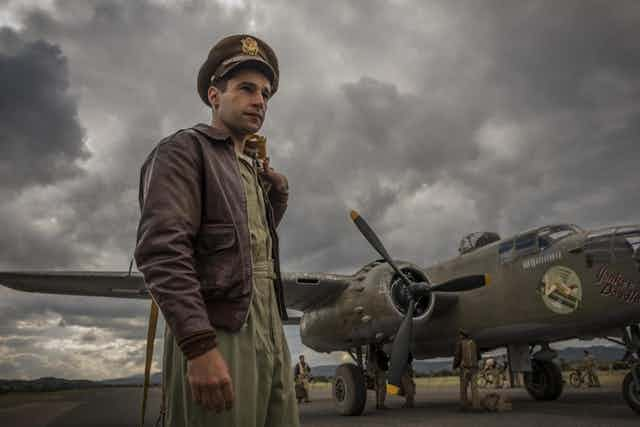George Clooney’s TV adaptation of the book Catch 22 lingers tenderly on the fragile scenic beauty of Italy, where the novel is set. The filming sustains a ravishing sense of the country’s peaceful loveliness – the stage for Joseph Heller’s caustic and bitter narrative of the insane absurdities of World War II.
Heller as a novelist does not aim to conjure such beauty. He concentrates more on the crazy business at hand – the sexual liaisons, the military technology, the gruesome violence, the evil bureaucracy and black economy of total war.
And on the page, Heller is far more effective at drumming up the hero bombardier Yossarian’s abject fear, caught in the engines of the war machine:
He was trembling steadily as the plane crept ahead. He could hear the hollow boom-boom-boom-boom of the flak pounding all around him in overlapping measures of four, the sharp, piercing crack! of a single shell exploding suddenly very close by. His head was bursting with a thousand dissonant impulses as he prayed for the bombs to drop. He wanted to sob. The engines droned on monotonously like a fat, lazy fly.
The TV series fails to convey that fear, despite the horrors of the deaths, the tragic cock-ups, the violence – because it looks too damn good, the flak puffing quietly away around the beautiful bombers in the Italian skies.
Neither can the adaptation make one feel the sickening blend of relentless fear and the flights’ endless boredom, which Heller’s prose is all about. Yossarian is trembling steadily, time itself drones on like the plane engines, so slowly, as if transporting him to his death monotonously.
At the same time, the prose is alive to the shocks of the flak, captured here as a manic force that has rhythm, that can explode within Yossarian’s consciousness like modernist music. The flak and droning fly of the machine he is in create a terrifying environment that is unremittingly, nightmarishly alien.
But most of all, Heller’s prose captures this mechanical hell with dark comedy. The prose bristles with zany mood shifts, word choices, surreal clashes – like a good stand up comedy routine.
In comparison, Clooney’s adaptation is not quite funny enough. The series has great performances from its leads, with excellent relish to the madness of the command, and routines that shade suddenly into horror, as with a stupid dive-bombing episode.
But Heller is funny and hates that he is. His very powers of entertainment, his ability to take us into Yossarian’s desperate malingering, his ferocious fear, and the rich comic absurdity of it all, are signs of the evil he experienced during the war.
It is the crazy comedy of the war’s violence and the staggeringly grotesque officer class that are Heller’s chief targets. Captain Black, for instance, whoops with delight that the bombardiers are going to be sent to certain death in the unbelievable “flak-fest” of Bologna.
“Oh boy! I can’t wait to see those bastards’ faces when they find out they’re going to Bologna,” he cries. “Ha, ha, ha!” He enjoys his laugh, and then seeks out the bombardiers in order “to wring the most enjoyment from the occasion”.
Violence and beauty
The dark comedy Heller deploys in the novel is actually the modus operandi of the whole command, allied to the simpler brutalities of plain bullying by officers eager to please superiors, and to the grotesque sadism associated with the exercise of power – all those taunting smiles, the malicious gloating and sarcastic laughs.
If the novel’s beats are determined by the acts of violence, then its comedy is shaped by the bullying logic of military command as a vicious joke – the true meaning of Catch-22.
The TV series is faithful to the book. It has purpose, comic determination to capture the ways sexual feelings of love, desire, and sadism fuse with capitalist greed to run the show. It revels in the dark joke of war’s violence in such splendid beauty.
But it cannot capture, quite, Yossarian’s abject fear, or the ruthless sense that the monsters of the war machine rule by the very dark comedy that is Heller’s stock in trade. When Joseph Heller returned home to New York after the war, he could no longer enjoy the roller coaster rides of Luna Park which he had relished as a boy. They reminded his body too much of the lurching bombers that had driven him out of his mind.
That is a symptom of post-traumatic stress disorder (PTSD). But it also signals how the joy of comic movement and a boy’s relish of comic delight had been poisoned – by the war’s recruitment of those very energies to its lethal cause.

